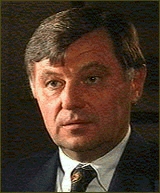
Miklós Németh
Encyclopedia
Miklós Németh served as Prime Minister of Hungary from November 24, 1988 to May 23, 1990. He was one of the leaders of the Socialist Workers' Party
, Hungary's Communist
party
, in the tumultuous years that led to the collapse of communism in Eastern
and Central Europe
.
As Prime Minister, Németh took the controversial decision to allow East Germans, long held captive by their country's communist regime, to pass through Hungary en route to freedom in West Germany
. This decision is widely credited with helping to bring about the fall of the Berlin Wall
on 9 November 1989.
After leaving office in 1990, Németh served as Vice President of the London-based European Bank for Reconstruction and Development
, the financial institution established by the international community to assist the countries of eastern and central Europe and the former Soviet Union
in their transition to democratic market economies. He left the EBRD in 2000 to return to Hungary. He attempted to become the PM-designate of the opposition socialist party
, but was unsuccessful, as Péter Medgyessy
was appointed to that role. Medgyessy later became Prime Minister.
Hungarian Socialist Workers' Party
The Hungarian Socialist Workers' Party was the ruling Marxist–Leninist party of Hungary between 1956 and 1989. It was organised from elements of the Hungarian Working People's Party during the 1956 Hungarian Revolution...
, Hungary's Communist
Communism
Communism is a social, political and economic ideology that aims at the establishment of a classless, moneyless, revolutionary and stateless socialist society structured upon common ownership of the means of production...
party
Party
A party is a gathering of people who have been invited by a host for the purposes of socializing, conversation, or recreation. A party will typically feature food and beverages, and often music and dancing as well....
, in the tumultuous years that led to the collapse of communism in Eastern
Eastern Europe
Eastern Europe is the eastern part of Europe. The term has widely disparate geopolitical, geographical, cultural and socioeconomic readings, which makes it highly context-dependent and even volatile, and there are "almost as many definitions of Eastern Europe as there are scholars of the region"...
and Central Europe
Central Europe
Central Europe or alternatively Middle Europe is a region of the European continent lying between the variously defined areas of Eastern and Western Europe...
.
As Prime Minister, Németh took the controversial decision to allow East Germans, long held captive by their country's communist regime, to pass through Hungary en route to freedom in West Germany
West Germany
West Germany is the common English, but not official, name for the Federal Republic of Germany or FRG in the period between its creation in May 1949 to German reunification on 3 October 1990....
. This decision is widely credited with helping to bring about the fall of the Berlin Wall
Berlin Wall
The Berlin Wall was a barrier constructed by the German Democratic Republic starting on 13 August 1961, that completely cut off West Berlin from surrounding East Germany and from East Berlin...
on 9 November 1989.
After leaving office in 1990, Németh served as Vice President of the London-based European Bank for Reconstruction and Development
European Bank for Reconstruction and Development
Founded in 1991, the European Bank for Reconstruction and Development uses the tools of investment to help build market economies and democracies in 30 countries from central Europe to central Asia. Its mission was to support the formerly communist countries in the process of establishing their...
, the financial institution established by the international community to assist the countries of eastern and central Europe and the former Soviet Union
Soviet Union
The Soviet Union , officially the Union of Soviet Socialist Republics , was a constitutionally socialist state that existed in Eurasia between 1922 and 1991....
in their transition to democratic market economies. He left the EBRD in 2000 to return to Hungary. He attempted to become the PM-designate of the opposition socialist party
Hungarian Socialist Party
The Hungarian Socialist Party describes itself as a social democratic party in Hungary. It is the partial successor of the communist Hungarian Socialist Workers' Party , which ruled Hungary between 1956 and 1989. The decision to declare the party a successor of the MSZMP was controversial, and...
, but was unsuccessful, as Péter Medgyessy
Péter Medgyessy
Péter Medgyessy is a Hungarian politician and was the fifth Prime Minister of the Republic of Hungary from May 27, 2002 until September 29, 2004...
was appointed to that role. Medgyessy later became Prime Minister.

